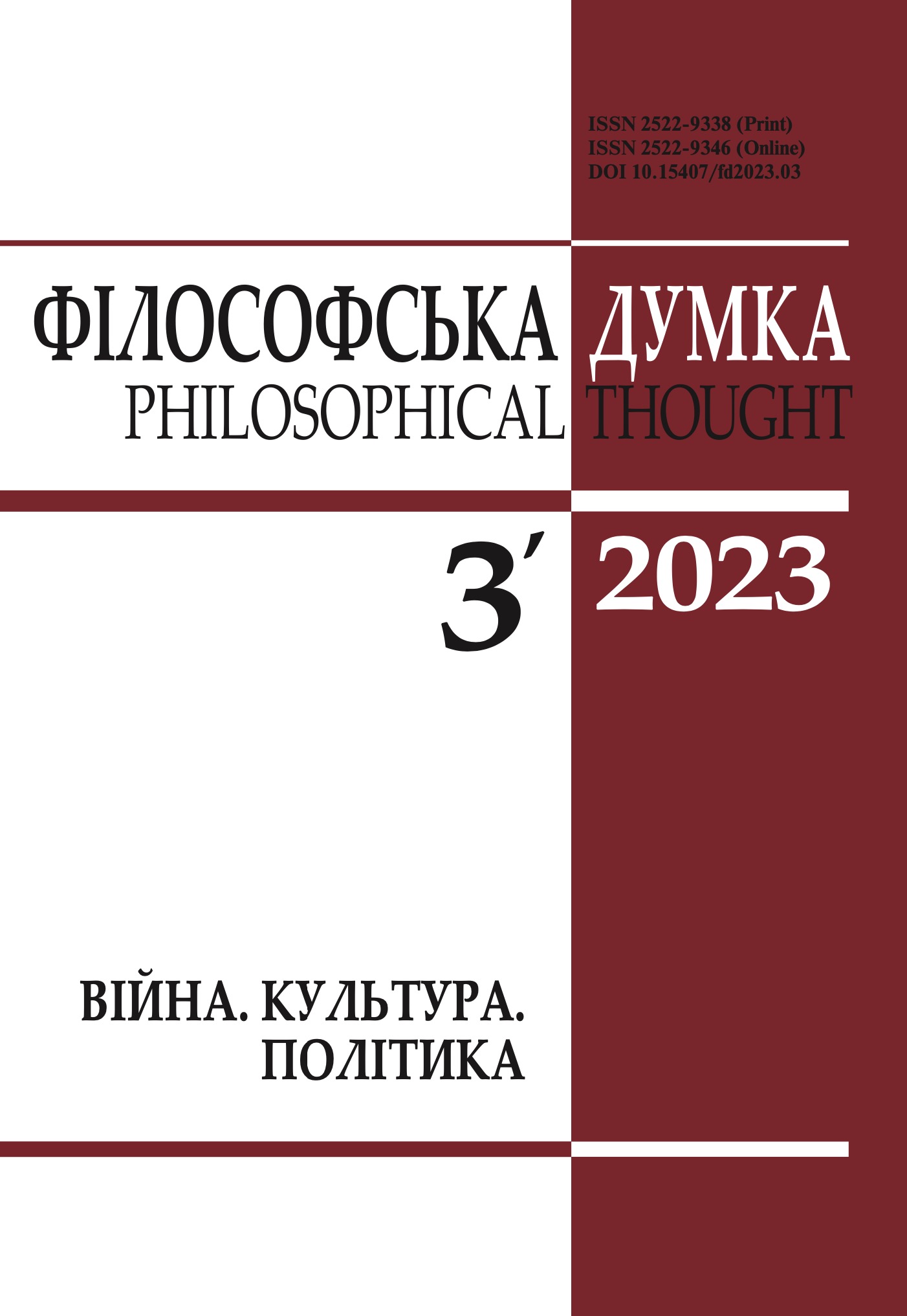SYMPHONIC COMPOSITIONS IN THE LITERARY AND EPISTOLARY HERITAGE OF HRYHORII SKOVORODA
CONTINUATION OF THE TOPIC: The philosophy of Hryhorii Skovoroda: History and modernity
DOI:
https://doi.org/10.15407/fd2023.03.069Keywords:
Hryhorii Skovoroda’s symphonism, manifestations of symphonism, dialogism, symphonic structure of thinking, Hryhorii Skovoroda’s correspondenceAbstract
The article explores the phenomenon of symphonism in the written and other intellectual heritage of Hryhorii Skovoroda. The study reveals that the conclusion about systemic symphonismbeing a property of the thinker’s reflections can only be hypothetical at this stage. This is due tothe fact that the source base of the present study includes a significant number of diverse works by the philosopher that have not yet received a proper archaeographic description. The matter of archaeographic description of sources in the history of philosophy research in Ukraine has not yet been positively resolved and is still in its formation. This article briefly presents the problematic range of source studies of Hryhorii Skovoroda’s works. It is, however, not limited to the suggested list and tends to expand. With this circumstance in mind, the boundaries of the research were limited to a selection of Hryhorii Skovoroda’s letters to various persons, which is contained in the most representative academic printed edition of his writings available today. The distinctive features of understanding the source heritage of the philosopher include its genre character and the way it was disseminated. All the major philosopher’s works were personally handwritten or replicated by other copyists in lists. This circumstance causes considerable difficulties in verifying the accuracy of the content of the original manuscript source in print. The presentation of the material is intentionally not systematic, but illustrative. The selection of extractsfrom the philosopher’s works contains the most distinctive examples of symphonicity, which illustrate the panorama of the growth of symphonic complexes from simpler to quantitatively more complex. The inherent polemical core of the study is to establish the correspondence between systemic symphonicity and dialogicity of the philosopher’s style of thinking. The conclusions about this could be drawn on the basis of historical and philosophical explication from certain sources. The author suggests that the development of dialogicity is preceded by a thorough justification of the principle of proper thinking by Hryhorii Skovoroda, which has a complex symphonic structure. From this perspective, dialogism does not contradict the fundamental symphonicity, but is rather one of its manifestations.
References
A consolidated dictionary of obsolete and little-used words. [In Ukrainian]. Retrieved from: http://litopys.org.ua/rizne/zvslovnyk.htm
Bahalii, D.I. (1992). Ukrainian itinerant philosopher Hryhorii Skovoroda. [In Ukrainian]. Kyiv:Publishing House “Orii”, “Kobza”.
Joy. (s.a.). In: World dictionary of the Ukrainian language. [In Ukrainian]. Retrieved from:https://uk.worldwidedictionary.org/%D1%83%D1%82%D1%96%D1%85%D0%B0
Kononenko T. (2010a). Musicological emphasis in the research of the philosophical heritage of H. Skovoroda. [In Ukrainian]. Ukrainoznavstvo, 4, 108-112.
Kononenko, T. (2006). Modeling of the character of H. Skovoroda’s thinking in the me tho dological culture of the New Philosophy of the XVI-XVIII centuries. [In Ukrainian]. Ukrainoznavstvo, 3, 52-57.
Kononenko, T. (2007). Structural symphony of H.S. Skovoroda’s philosophical works. [In Ukrainian]. Ukrainoznavstvo, 1, 56-62.
Kononenko, T. (2008a). Folk-customary horizons of the philosophy of H. Skovoroda. Introductionto the methodology of Ukrainian studies. [In Ukrainian]. Kyiv: Research Institute of Uk rainian Studies.
Kononenko, T. (2010b). The divine symphony of Hryhorii Skovoroda: Ukrainian studies dimensions of the philosophical heritage. [In Ukrainian]. Ternopil: Dzhura.
Kononenko, T.H. (2003). H.S. Skovoroda as a friend of the wisdom of the Ukrainian terrain. In honor of the 280th anniversary. [In Ukrainian]. Ukrainoznavstvo, 1(6), 40-43.
Kononenko, T.P. (2008b). The heritage of H. Skovoroda at the level of contamination of faith,philosophy and art. [In Ukrainian]. In: Collection of Scientific Works of the Research Institute of Ukrainian Studies (Vol. XX, pp. 402-412). Kyiv: Ukrainian Information and Printing Agency «Rada».
Makarenko, H.H. (2004). Music and philosophy: Schopenhauer, Wagner, Nietzsche. [In Ukrainian]. Kyiv.
Shevchenko, T. (2003). Collection of works: In 6 Vols. [Vol. 2: Poetry 1847—1861 (pp. 94—95;605—606)]. [In Ukrainian]. Kyiv. Retrieved from: http://litopys.org.ua/shevchenko/shev227.htm
Shevchenko, V.V., Chaikovskyi, M.Ye. (2022). The phenomenon of Hryhorii Skovoroda is on thecall of time. [In Ukrainian]. Kyiv: Sammit-knyha. Shevchuk, V.O. (2008).
Piznanyi i nepiznanyi Sfinks: Hryhorii Skovoroda suchasnymy ochyma:rozmysly. [In Ukrainian]. Kyiv: Univ. vyd-vo PULSARY,
Shreier-Tkachenko, O.Ya. (1972). Hryhorii Skovoroda as a musician. [In Ukrainian]. Kyiv: Muzychna Ukraina.
Skovoroda, Hryhorii. (2010). A complete academic collection of works. Ed. by Prof. L. Ushkalov.[In Ukrainian]. Kharkiv: Maidan. Retrieved from: https://diasporiana.org.ua/miscellaneous/grygorij-skovoroda-povna-akademichna-zbirka-tvoriv/ Sonata. (s.a.). [In Ukrainian]. Retrieved from: 12.7: Sonata - LibreTexts - Ukrayinska
The complete academic collection of Hryhorii Skovoroda’s works. [In Ukrainian]. Kyiv: Folio.Re trieved from: https://folio.com.ua/books/Povna-akademichna-zbirka-tvoriv-Grigo riya-Skovorodi].
Tychyna, P. (1971). Skovoroda. Symphony. Introductory article by S.V. Telniuk. [In Ukrainian].Kyiv: Radianskyi pysmennyk.
Downloads
-
PDF (Українська)
Downloads: 327
Published
How to Cite
Issue
Section
License
Authors who publish with this journal agree to the following terms:
- Authors retain copyright and grant the journal right of first publication.
- Authors are able to enter into separate, additional contractual arrangements for the non-exclusive distribution of the journal's published version of the work (e.g., post it to an institutional repository or publish it in a book), with an acknowledgement of its initial publication in this journal.
- Authors are permitted and encouraged to post their work online (e.g., in institutional repositories or on their website) prior to and during the submission process, as it can lead to productive exchanges, as well as earlier and greater citation of published work (See The Effect of Open Access).


